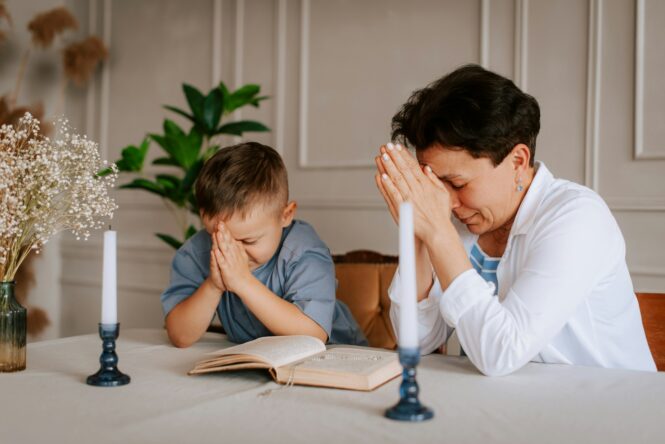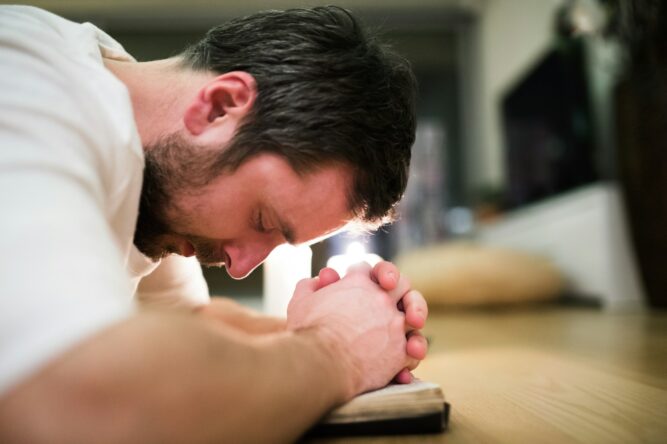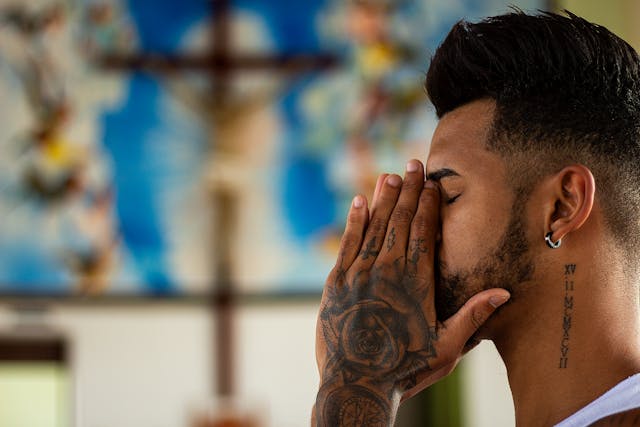When your childhood was filled with chaos—whether that meant instability, fear, neglect, or emotional confusion—it doesn’t just impact your relationships with people.
 Source: Pexels
Source: Pexels It can also subtly shape how you relate to God, faith, or any kind of spiritual life. You might struggle with trust, worthiness, or even the idea of being loved without condition. Here are just some of the ways that kind of upbringing can leave a lasting imprint on your spiritual connection.
1. You struggle to believe in unconditional love.

If love was something you had to earn or chase growing up, the concept of a God who loves you freely might feel foreign. It sounds good, but part of you doesn’t believe it applies to you. This can lead to overcompensating spiritually—trying to “do enough” to feel worthy, or avoiding God altogether because the idea of being fully accepted feels emotionally unsafe.
2. You associate quiet moments with danger, not peace.

For some people, prayer or reflection is calming. However, if silence in your childhood meant something was about to go wrong, those moments can feel tense or emotionally exposed. Instead of feeling held in stillness, you might feel vulnerable or uneasy. It can make spiritual practices like meditation or prayer feel more activating than grounding.
3. You’re constantly waiting for punishment.

When you grow up walking on eggshells, you get used to consequences that feel random or unfair. That fear doesn’t always go away—it can just get transferred onto your spiritual life. You might see God as someone who’s just waiting for you to mess up. Even when life is going well, there’s a quiet part of you that braces for the other shoe to drop.
4. You question whether your prayers even matter.

In a chaotic home, your needs might have been ignored or dismissed. That experience can stick with you, even when you’re reaching out to something bigger than yourself. When prayer feels like it disappears into the void, it can echo that old feeling of not being heard. And that makes it hard to trust that your voice carries weight, even spiritually.
5. You’re wary of authority, even divine.

Authority figures in your early life might have been unpredictable or hurtful. So when someone says, “God is in control,” it doesn’t always feel safe—it feels like giving power to something that might not protect you. This can make it tough to lean into faith fully. You might crave comfort and clarity but flinch at the idea of surrendering to something that reminds you of past power imbalances.
6. You feel guilt for questioning or doubting.

If you were taught that loyalty means obedience, any spiritual doubt might feel like a betrayal. You might keep your questions to yourself or feel ashamed for not having a clear belief system. Of course, real faith, whatever shape it takes, is built through honesty, not performance. That guilt doesn’t mean you’re bad at believing; it just means you were taught to hide uncertainty instead of explore it.
7. You tie your worth to how “good” you are spiritually.

Some people with chaotic upbringings become hyper-responsible, trying to do everything right to avoid rejection. This can carry over into faith, where being spiritual becomes another way to stay safe or gain approval. If you don’t pray enough, attend enough, or believe strongly enough, you might spiral into shame. It turns connection with God into something that feels like pressure instead of peace.
8. You feel like you’re always on the outside looking in.

Being the kid who never quite fit in—emotionally, socially, or even physically—can make spiritual communities feel equally distant. You might show up, but still feel separate. This can create a sense that you don’t belong in spiritual spaces, or that you’re faking something everyone else seems to “get.” That outsider feeling sticks around long after childhood ends.
9. You struggle to trust spiritual experiences.
 Source: Unsplash
Source: Unsplash If your past involved manipulation, gaslighting, or emotional chaos, it can be hard to know what’s real. Even if you feel something deeply spiritual, part of you might question it. You’ve learned not to trust your feelings. So even when something sacred stirs in you, there’s a voice saying, “Don’t be naive.” That scepticism is protective, but it also keeps you from feeling fully safe in the experience.
10. You feel responsible for saving or fixing other people spiritually.

Kids in chaotic households often step into caretaker roles. That can carry into adulthood as a need to “rescue” other people emotionally, or even spiritually. You might feel pressure to have all the answers, carry other people’s struggles, or fix what’s broken in someone else’s faith. It comes from a good place, but it leaves you spiritually exhausted.
11. You’re afraid of vulnerability, even with God.
 Source: Unsplash
Source: Unsplash In an unpredictable home, opening up might have got you hurt, embarrassed, or dismissed. So even when you’re praying or reflecting, there’s a filter—you’re never fully open. Spiritual vulnerability feels risky, like saying too much might somehow backfire. It’s not that you don’t want closeness; it’s just that being fully seen still feels dangerous, even with the divine.
12. You search for control in your spiritual life.

Chaos teaches people to look for order wherever they can. That’s why many people with tough upbringings gravitate toward strict spiritual rules, routines, or systems—they make things feel predictable. However, when those systems become rigid, faith can turn into fear. You might be more focused on doing everything “right” than actually feeling connected to what you believe in.
13. You carry shame you can’t explain.

Even if you’ve come a long way in healing, there might still be a part of you that feels “bad,” broken, or spiritually unworthy. It’s not based on anything you’ve done—it’s a story you absorbed early on. This shame can make it hard to believe you’re loved by something greater. You can hear the words, but they don’t quite land. The healing comes slowly, and with kindness—not more shame about the shame.
14. You crave spiritual connection but feel disconnected.

You want to believe. You want to feel close to something meaningful. But no matter how hard you try, there’s a distance that won’t close. And it’s frustrating because it’s not from lack of effort. That disconnect often comes from old emotional blocks, not lack of faith. When trust and safety weren’t modelled early on, building them, especially with something unseen, can take time and deep unlearning.
15. You find your way back through softness, not force.

If you’ve felt distant from God because of your past, it’s not something that gets fixed through pressure or performance. It usually begins with something quieter—a moment of honesty, a peaceful walk, a conversation that feels safe. Thriving spiritually after a chaotic start doesn’t mean finding perfect faith. It means finding a connection that feels true, healing, and yours. That can still be sacred, even if it took the long way around.




